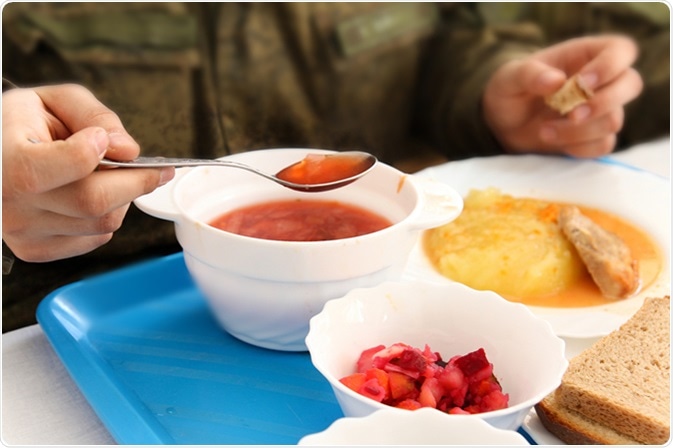Due to the rising levels of obesity and increased access to health information, many individuals are turning to dietary plans to lose weight. The military diet is one such plan which promotes rapid weight loss. However, there are several associated risks with losing a significant amount of weight over a short period.
What is the Military Diet?
Many diets promise to help dieters lose weight rapidly. The military diet is characterized as an extremely low-calorie diet designed to help followers lose 10 pounds per week. The 3-day diet outlines specific foods to be consumed for breakfast, lunch, and dinner. Followers maintain a regular, healthful diet for the following 4 days each week. For those wishing to lose more than 10 pounds,, the diet can be repeated in cycles with 3 days of dieting and 4 days of regular eating.

Image Credit: Eanstudio / Shutterstock
What Food is Allowed on the Military Diet?
Those following the military diet are told to adhere strictly to the food schedule to reap any potential benefits. A 3-day menu outlines the specific foods and drinks to be consumed. A menu is outlined below.
Breakfast
- 1 slice of toast
- 2 tablespoons of peanut butter
- 1/2 grapefruit
- 1 cup of tea or coffee with no sugar or milk
Evening Meal
- 1/2 cup of carrots
- 1 cup of broccoli
- 2 hot dogs without the buns
- 1/2 banana
- 1/2 cup of vanilla ice cream.
The target caloric intake for the diet (for both the 3 days and the 4 regular days) should be 1,500. Although calorie restriction itself is appropriate for overweight persons who wish to lose weight, the content of the military diet can lead to undesired health consequences.
Lack of Dietary Fiber
It is recommended that all persons consume high levels of dietary fiber, but this is especially important for those following low-calorie diets. Due to the lack of variety in the food permitted on the military diet, the diet may not meet the recommended daily intake of fiber. Dietary fiber is important in reducing the risk of diabetes and coronary heart disease over the long-term. In the short term, a lack of dietary fiber in the military diet may cause constipation.
Lack of Nutrients
Again, due to the lack of variety in the foods allowed on the military diet, the diet may not provide adequate nutrition. For example, non-starchy vegetables such as spinach, brussels sprouts, and kale are recommended as part of a balanced diet. Consuming such foods is thought to reduce the risk of developing heart disease and cancer. However, these types of vegetables are not featured in the military. Adherents to the diet may experience malnutrition.
Gallstones
For those trying to lose weight, it is recommended that only 1 to 2 pounds of weight should be lost per week. Those who lose weight rapidly, such as the promised 10 lb per week in the military diet, are at risk of developing gallstones. Gallstones are pebble-like materials typically comprised of cholesterol that form in the gallbladder. If a significant amount of weight is lost in a short period of time, the liver can release additional cholesterol into the bile and cause problems with gallbladder emptying. In serious cases, gallstones can cause abdominal pain secondary to bile duct blockage. If left untreated, major complications can result.

Gallstones, 3D illustration showing bottom view of liver and gallbladder with stones. Image Credit: Kateryna Kon / Shutterstock
Muscle Loss
One well-established risk of rapid weight loss is muscle atrophy. Studies comparing the effects of rapid weight loss with slow and sustained weight loss show that those experiencing rapid loss are more likely to have muscle wasting. Over time, loss of muscle mass has been associated with higher levels of morbidity and mortality. The negative consequences of muscle atrophy can be exacerbated in those with type 2 diabetes.
Effectiveness as a Weight Loss Tool
In addition to health risks, the military diet might not actually be an effective tool to help lose weight. Typically, low-calorie diets like the military diet should also have a low glycemic index. The glycemic index is used to classify foods based on carbohydrate content. The glycemic index reflects the blood glucose response to a specific food compared with the response to an equivalent amount of comparative carbohydrate such as white bread. Diets with a low in glycemic index are linked to increased satiety, suggesting that the military diet may not be a sustainable tool for weight loss, as followers may consume prohibited food to satisfy hunger.
There is a body of evidence that suggests that low-calorie diets such as the military diet may be associated with a range of short-term and long-term risks. Many argue that to achieve a safe and sustainable weight loss, it must be done steadily over a prolonged period of time.
Further Reading
Last Updated: Jan 29, 2019